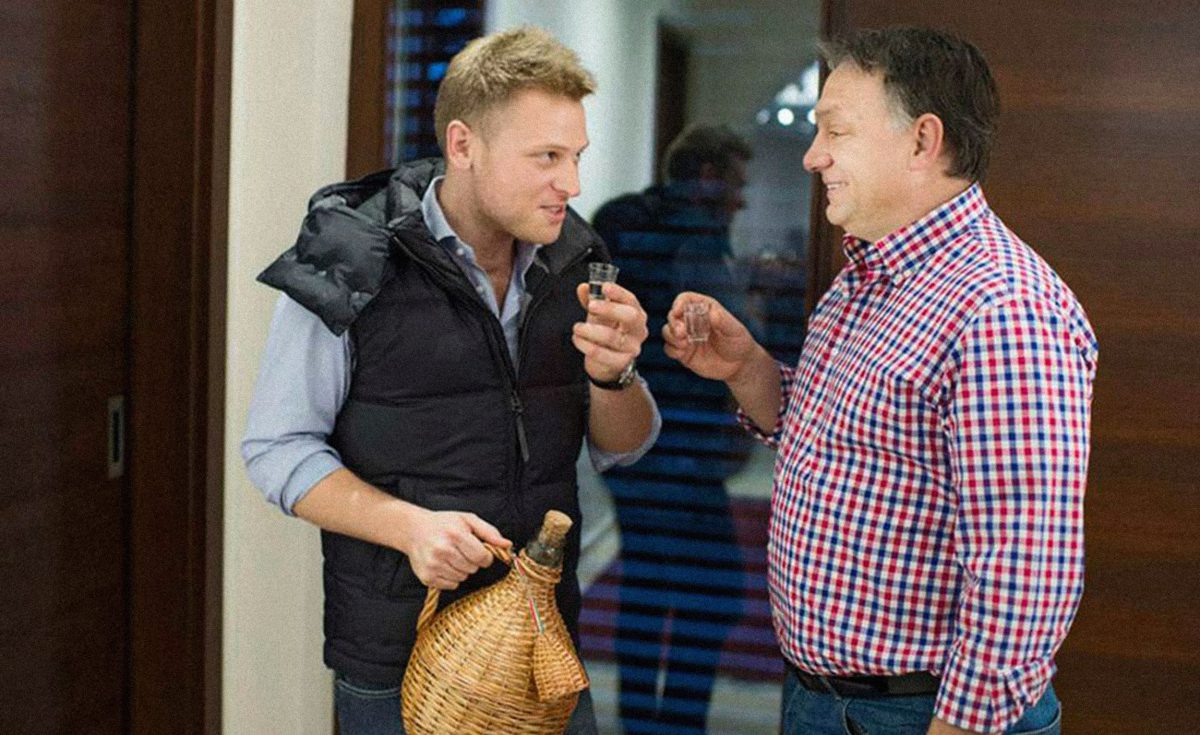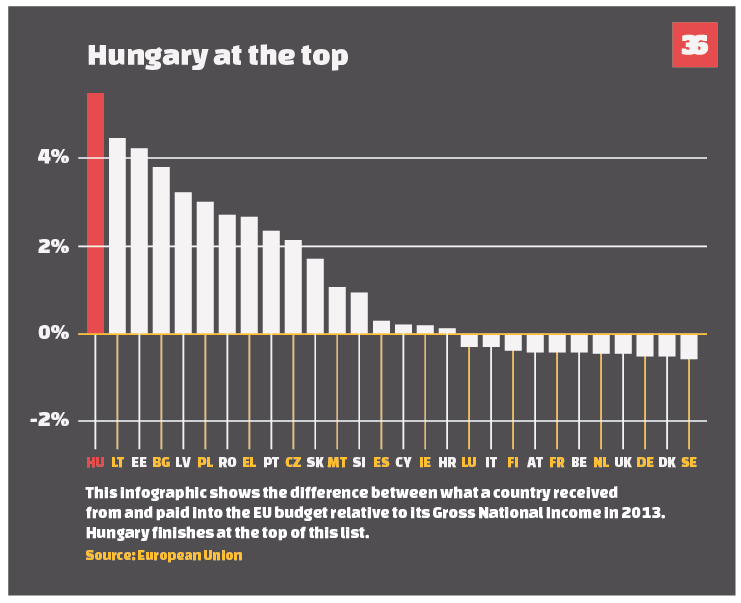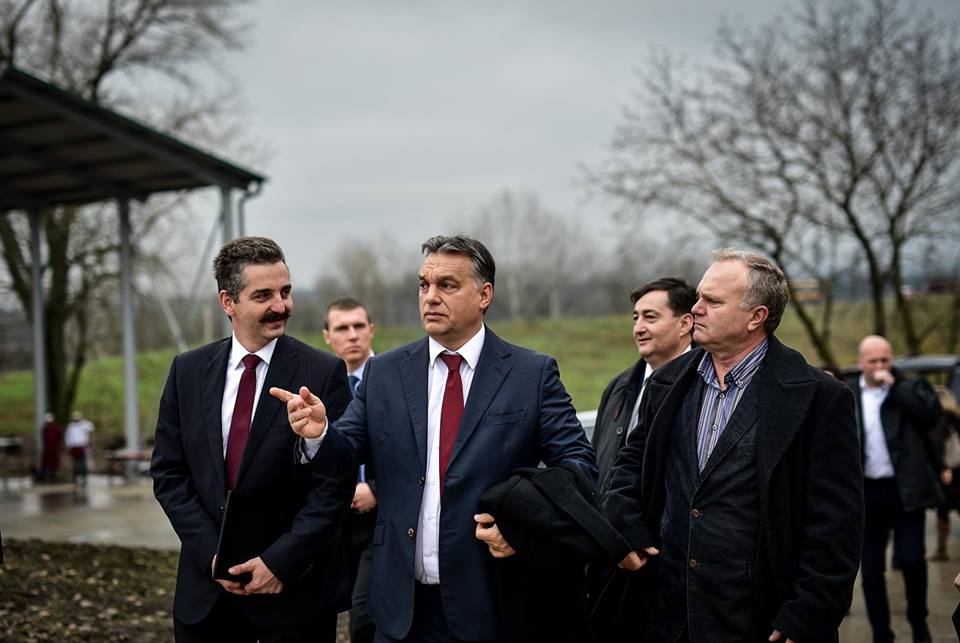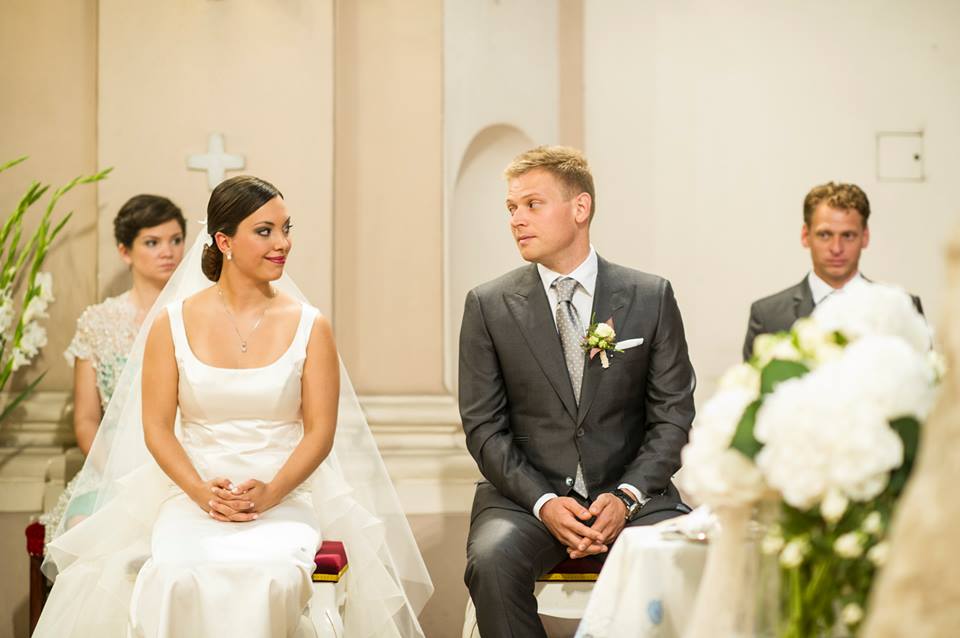How Western Taxpayers Help Boost the Businesses of Hungary PM’s Inner Circle

Once he compared Brussels to the Moscow of communism’s darkest period. He often describes the West with pity, saying that it is in a deep and perhaps irreversible social and economic crisis. In a speech last year he listed positive examples only from the Eastern hemisphere, including Russia, China, and Turkey.
What the prime minister does not talk about is that businesses of some people with close personal ties to him have benefited enormously from the country’s EU membership. Since Orbán returned to power in 2010, the performance of these companies has been boosted by their participation in projects funded in full or partly by the EU, from a budget that is contributed mostly by Western countries.
This is true for Lajos Simicska, who became friends with Mr. Orbán in high school, and though at the moment they are engaged in an apparent power struggle with each other, until recently they had been close allies. This is true for Lőrinc Mészáros, who grew up in the same village as Orbán and now serves as the chairman of the foundation that runs the prime minister’s pet project, a football academy. And it is also true for a member of the prime minister’s family, István Tiborcz, the husband of his oldest daughter.
It has been well documented that the businesses of these people performed spectacularly well on state procurement tenders in the past five years. Since the majority of state projects in Hungary are funded at least partly by the European Union, it has also been assumed that these businesses have received EU money. But its extent has been hard to determine because the data allowing tracking EU money are hidden in documents of separate government databases.
Direkt36’s journalists spent weeks analyzing the documents of nearly 300 state contracts won by these companies. This analysis – based on government databases and data collected by the anti-corruption group K-Monitor, and two research groups: Microdata and Corruption Research Center Budapest – suggests that each company has benefited hugely from the EU budget.
Records show that projects funded by the EU constitute 88 percent of the value of the state contracts – totalling billions of euros – won by companies linked to Lajos Simicska. While this number does not necessarily reflect the actual share of EU money in the companies’ revenues, it shows that EU-funded projects are a major part of their business. The proportion of EU projects is even higher in the case of the companies of István Tiborcz and Lőrinc Mészáros, which also won contracts totalling several hundred million euros. In the case of Elios Innovativ, an energy company co-owned by Tiborcz, the share is 94 percent. Lőrinc Mészáros’s construction company, Mészáros and Mészáros, has a share of 99 percent.
The analysis also shows that nearly one-fourth of these contracts were won by these companies when they were the sole bidders. This corresponds with average procurement numbers: CRCB’s data show that between 2010 and 2014 the rate of tenders with sole bidders ranged from 26 to 31 percents. Winning without competition was, however, extraordinarily frequent in the case of Elios Innovatív, which in the past year has received more than half of its contracts for EU-funded projects on tenders where there were no other bidders.
The companies and the prime minister’s office did not respond to questions.
Whose money?
The contracts won by the companies range from gigantic construction projects worth hundreds of millions of euros to small PR events costing a few thousand euros. What is common in these projects is the requirement of onsite displays showing that the funding came from the European Union. The billboards, however, may as well say that the costs were covered by the taxpayers of Western member states.
The reason for this lies in the structure of the EU’s budget. Each member state contributes to it but some get back more than they pay while others receive less than their original contribution. The first category contains poorer countries mostly from Eastern and Central Europe while the latter includes mostly the rich and developed member states in the West and the North, with Germany, Denmark, and Sweden at the top.
The goal of this uneven distribution is to help poorer countries catch up with the rich ones. “This is one of the objectives of the European Union’s development policies. Solidarity, in addition to economic and other forms of integration, has been an important element of the community ever since the Treaty of Rome”, says Judit Kálmán, an economist focusing on EU development at the Hungarian Science Academy’s Economics Institute, referring to the landmark treaty signed in 1957.
As a recipient of the so-called Structural Funds, Hungary has been one of the biggest beneficiaries of this system in the past few years. “In the previous cycle, which lasted from 2007 to 2013, per capita we were the second biggest beneficiaries of the Structural Funds subsidies”, says Kálmán, adding that in the new cycle the money available is less but Hungary is still among the countries at the top, ranking fourth based on the amount relative to population.

Source: Direkt36, Gyula Németh
The economist, however, mentioned that Western member states benefit from this system, too. On one hand, some of the development policies (such as sustainable growth, security and social cohesion) serve the interest of the whole EU. On the other hand, companies from the Western member states have access to bigger markets thanks to the EU’s enlargement and can also apply for development funds through their subsidiaries – like the Audi car factory in Hungary – in poorer member countries. “There are channels where some of the money goes back to the West”, says Kálmán.
Though the whole system might only be described with a complicated formula, the equation is very simple in the case of businesses tied to Mr. Orbán’s inner circle. Over the past five years, the companies’ performance has been improving enormously while being awarded more and more state contracts financed mostly by EU.
Közgép, the flagship company of the Simicska empire, had been a major player in the construction business even before 2010, but it has raised its revenue by 50 percent since then, to nearly 200 million euros in both 2012 and 2013. Mészáros’s construction company, Mészáros and Mészáros, had revenues of only 2.8 million euros in 2010 but by 2013 it grew more than tenfold to 31.8 million euros. Elios Innovatív, co-owned now by Orbán’s son-in-law, was founded in 2009 and has had millions of euros in revenues within just a few years.
State contracts appear to have played a significant part in their spectacular growth. Although none of the companies answered Direkt36’s questions, the website of Közgép and Elios list state projects as references almost exclusively (no website could be found for Mészáros and Mészáros). Elios’s list includes a few private projects but it is not clear if those were actually carried out directly by the company as several of those have a comment saying that “this is the personal reference of our manager in this line of business”.
A new family member
The prime minister’s office did not respond to questions asking whether Mr. Orbán has known that companies of people close to him have been the beneficiaries of EU development projects.
He has had ample time to discuss this with István Tiborcz. The 28-year-old man married the prime minister’s oldest daughter, Ráhel, in September 2013. Just before the wedding, Mr. Orbán told Blikk, a tabloid newspaper, that “I met István for the first time five years ago, but I had known his parents even before that. His father is a doctor, and they have a prosperous farming business”.
There are also photos showing the two men together. During Christmas 2013, pictures were taken of Orbán and Tiborcz drinking pálinka, a strong Hungarian spirit, in the young couple’s home.
Mr. Tiborcz got into business at a young age. He was 23 years old when he participated in the founding of the predecessor of Elios Innovatív. Later, he got involved in consultancy and real estate companies. Recently, he and his business partners purchased a company operating a harbour at Balaton, Hungary’s largest lake, as was reported by Átlátszó.
Mr. Tiborcz does not give interviews but a recent comment by his wife suggested that they live in comfortable circumstances. “We have our own family with my husband, we stand on our own feet, we succeed thanks to our own efforts, we live our own life”, she wrote on Facebook, as an apparent reaction to some inquiries on how she could afford to study in a Swiss private school where tuition is more than 58,000 Swiss francs (53.800 euros).
A friend from the village
Lőrinc Mészáros and Viktor Orbán have known each other since childhood. They went to the same elementary school in Felcsút, a small village about 45 kilometers from Budapest. The prime minister referred to their common roots when he inaugurated a building in Felcsút a year ago. He recalled that the Mészáros family was so strongly against communism that their children were the only ones in the school who did not join the pioneer movement. “They could not even put a pioneer tie on Lőrinc’s neck”, said Orbán.
Former schoolmates, however, say that Orbán and Mészáros did not have a close relationship when they were children. Mészáros is three years younger than Orbán, which is a big difference at that age. Their status in the school was also very different, said former schoolmates who spoke on the condition of anonymity because they did not want to talk publicly about the two powerful people. Orbán was regarded as a leader by his peers even then and he was also popular among girls. Mészáros, by contrast, was never at the center of attention and his former schoolmates remember him as a hapless little boy.

Viktor Orbán in the center, behind him on the right Lőrinc Mészáros – Source: Viktor Orbán Facebook
They were also different in their approach to football. Orbán was a devoted player while Mészáros is remembered as “being afraid of the ball”. Still, it was football that brought the two men together as adults. Mészáros was sponsoring Felcsút’s team where Orbán was a certified player even in the 1990s. Later Mészáros became chairman of the foundation that Orbán established to run a football academy in Felcsút.
Locally, Mr. Mészáros was considered a successful businessman even before 2010, but has since become known nationally, thanks to his construction company’s involvement in some big, mostly EU-funded projects. This company, Mészáros and Mészáros, also received direct subsidies from the EU in 2011 and 2012 to upgrade its operations. The company got more than 300,000 euros for “technological” and “innovation” developments, records show.
Mr. Mészáros has also been active in farming, an industry heavily subsidized by the EU. Since 2010, he, his family members and his companies have received more than 1.2 million euros in farm subsidies, records show.
A broken friendship
Of the three businessmen it is Mr. Simicska who had the longest and seemingly deepest friendship with Orbán. They became friends in high school, later went to the same law school, and spent most of their adult life building up Fidesz, the party now governing the country. Orbán was fighting on the frontline of politics while Simicska was working behind the scenes to provide a solid financial background.
Simicska built an empire which depends mostly on state contracts. His flagship company is Közgép but he is also involved in other industries. His advertising and media companies have also been awarded lucrative state contracts since 2010 and records show that many of those projects were also funded by the EU. Since 2010, agriculture companies co-owned by Simicska also received more than 22 million euros in EU farm subsidies.
Now, however, the friendship that once seemed unbreakable between Orbán and Simicska appears to be over. The first signals of the deteriorating relationship came about a year ago when people linked personally to Simicska started to lose their positions in the government. Later, the government proposed changes hurting the interests of Simicska’s companies. Some of these were withdrawn, but others – like a tax on advertising and changes in the distribution of farm subsidies – were not.
For a long time, however, there were only rumours about the souring of their personal relationship. Orban suggested in a December interview that these might be true. When asked about how the alleged power struggle might affect his friendship with Simicska, he said that “life might solve it”.
Simicska recently made it clear that this would not happen any time soon. “Orbán is a spunk,” he said at the beginning of February in a series of interviews prompted by his outrage at the abrupt resignation of executives at his media companies, a move reportedly linked to the government’s new media policies. Simicska’s open – and colorful – criticism of Orbán stunned many in Hungary, but a person close to him said that he had criticised the prime minister in private conversations months before.
Still, the indirect working relationship between the two has not ended. One of Simicska’s companies, Mahir Exhibition and Event Organizer, was awarded a contract by the prime minister’s office in last December. The company’s job is to assist Mr. Orbán’s office in communicating the projects funded by the European Union.
The way of the EU funds
Even the deepest analysis of the public databases did not reveal how much EU money the companies linked to Mr. Orbán’s inner circle have already received. Some of the projects have not ended, meaning that the companies have not been paid yet. And if we consider only the value of the contracts won by the companies the number is highly distorted.
This is because the companies have won most of the contracts as part of consortia and public documents do not reveal how the members of the consortia share the money among each other. Közgép, for example, is carrying out 68 of its 78 projects as part of a consortium so it is likely to receive only a fraction of the 2.1 billion euros it has in contracts tied to EU projects. (Two other Simicska-companies, Dunántúli Telecommunications and Mahir Exhibitions and Events, have additional contracts worth 32 million euros.)
Many EU-subsidized projects are partly financed by the national government, which also makes tracking the money difficult. The share between the EU and the national government varies. There are projects that get all of their funding from the EU, while others get less than half.
Similar variations can be found among the contracts of Simicska’s, Mészáros’s and Tiborcz’s companies, though Direkt36’s analysis shows that the vast majority of their projects received significant EU subsidies. At least one-third of the projects are completely financed by the EU and another one-third received at least 75 percent of its funding from the EU. The share of similarly funded projects may be even higher but not all contracts could be analysed for this purpose due to the lack of data.
When the EU pays the bills
Of the three business groups, it is Elios Innovatív, the energy company co-owned by the prime minister’s son-in-law, where the flow of EU money is the easiest to trace. Since 2010, the company has amassed contracts, related to EU-funded projects, worth more than 20 million euros.
Mr. Tiborcz served as board member from 2009 to January 2014 and became co-owner through one of his companies in April 2014. His ownership stake coincided with the start of Elios’s recent successes in state tenders.
In the previous two years Elios won only four state projects. Since the beginning of 2014, it has been awarded 21 – mostly EU-funded – contracts. The company won these alone – not as part of a consortium – and nearly half of them have 100 percent funding from the European Union. The rest also receives a high share – 85 percent – of EU funding.
These successes since the beginning of 2014 are also remarkable because Elios won more than half of the EU-funded contracts as the sole bidder. The total value of these contracts is more than 10.8 million euros.
In January 2015, the company was awarded a contract worth 2.7 million euros to improve the street lighting system in the rural city of Zalaegerszeg. Elios was the sole bidder in the tender. A spokesperson for the mayor’s office said that they had no choice but to declare Elios the winner: “Since the bid was valid, the procedure had to be concluded by announcing a winner according to the law.”
For information on companies, we used the databases of Opten and Ceginfo.



